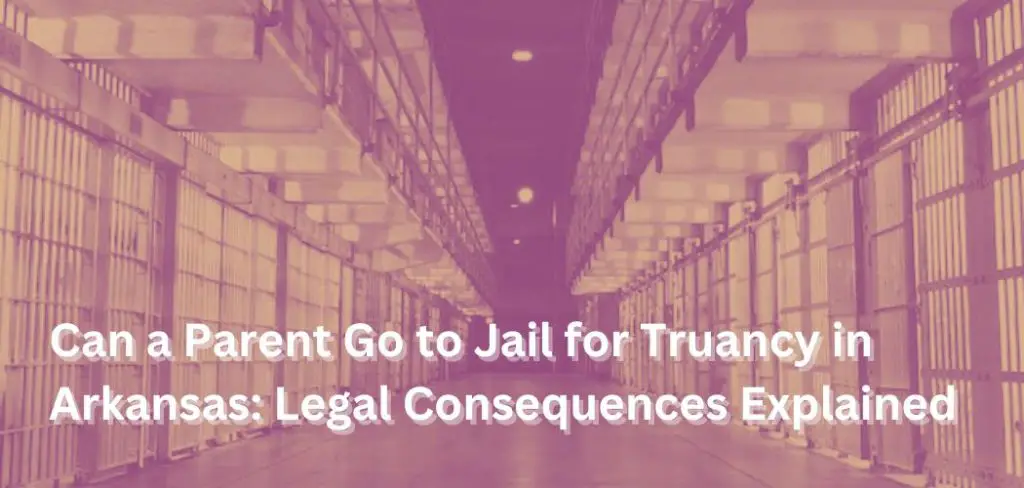Truancy, or the habitual failure to attend school without valid reasons, is a serious concern for parents and school districts across the United States.
In Arkansas, like in many other states, truancy laws have been established to ensure children receive the necessary education and skills development for their future success.
However, many parents may wonder whether they can face legal ramifications for their child’s truancy in the state of Arkansas.
The Arkansas truancy laws impose specific requirements on both school districts and parents.
Parents are responsible for ensuring their child attends school regularly, and school districts are responsible for enforcing attendance policies.
Failure to fulfill parental responsibilities under these laws can lead to various consequences, including fines, participation in attendance improvement programs, or even potential jail time.
It is crucial for parents to understand their rights and responsibilities under Arkansas truancy laws.
Key Takeaways
- Arkansas truancy laws hold parents responsible for ensuring their child’s regular school attendance
- Penalties for truancy in Arkansas can include fines, attendance improvement programs, or even potential jail time
- Parents should familiarize themselves with their rights and responsibilities under Arkansas truancy laws
Arkansas Truancy Laws
Arkansas truancy laws are established to ensure that all children in the state receive an adequate education within the compulsory attendance age.
The state laws hold parents and guardians accountable for their child’s attendance at public or parochial schools.
In Arkansas, compulsory attendance applies to children aged 5 to 18. Parents are required to enroll their children in a public, private, or parochial school, or to provide a homeschooling curriculum that meets state guidelines.
Failure to comply with the state’s education laws can result in legal consequences for the parents or guardians.
Truancy is defined as a child’s unauthorized absence from school without a valid excuse. The Arkansas Department of Education’s Rules Governing Student Attendance and Support provide specific guidance on how many unexcused absences warrant intervention.
For example, after five unexcused absences within a semester, school officials are required to notify the parents or guardians in writing.
The state imposes penalties on parents or guardians if they fail to remedy the truancy problem.
According to Arkansas Code § 6-18-222, a parent or guardian can be charged with a violation of the compulsory attendance law if they knowingly allow their child to miss school without a valid reason.
This offense is considered a Class C misdemeanor and can result in a fine of up to $500.
In extreme cases, parents or guardians can be charged with contributing to the delinquency of a minor and may even face jail time.
This can happen if they willfully encourage or allow their child to continue missing school, or if the child becomes involved in criminal activity as a result of truancy or lack of proper supervision.
In conclusion, Arkansas truancy laws seek to protect the educational rights and welfare of children in the state, and parents need to be aware of their legal responsibilities to ensure their child’s regular school attendance.
Failure to do so can lead to fines and, in rare circumstances, even jail time.
Penalties for Truancy in Arkansas
Fines and Community Service
In Arkansas, truancy is considered a form of educational neglect, and it can result in various penalties for both the child and the parents or guardians.
For the child, fines may range from $25 to $500, and they may be required to complete community service hours as a form of punishment.
Other Sanctions and Penalties
Aside from fines and community service, truancy in Arkansas can lead to other sanctions and penalties as well. School-related consequences may include in-school suspension, out-of-school suspension, or even expulsion in more severe cases.
These disciplinary actions are intended to encourage regular attendance and help the student understand the importance of education.

The court may also impose other sanctions, such as requiring the parent or guardian to attend parenting classes or counseling sessions.
Additionally, the court may choose to involve family courts or the juvenile court system if they determine that the case is severe enough.
Legal Ramifications for Parents and Guardians
Parents and guardians of truant children can be held legally liable for their child’s absence from school.
In Arkansas, a parent or guardian who knowingly permits their child to miss school may face a fine of up to $500 per day of truancy.
Court orders to attend school may also be issued; failure to abide by such orders can result in further legal consequences for the parents or guardians.
In more serious cases, the court may decide to revoke or suspend the parent or guardian’s driver’s license as a form of punishment.
This measure is typically implemented when the parent or guardian demonstrates blatant disregard for the importance of education in their child’s development.
While the penalties mentioned above cover the majority of truancy cases in Arkansas, it is essential to understand that individual circumstances may vary. Ultimately, the goal is to ensure students are receiving an education that will positively impact their lives and contribute to their growth and development.
Exceptions and Exemptions
In Arkansas, there are specific situations where a parent may not be held accountable for their child’s truancy. While the state emphasizes the importance of regular school attendance, certain exemptions and exceptions apply, focusing on valid excuses, age requirements, and other factors.
When considering a valid excuse, the law acknowledges that some instances of absence are justifiable. These may include illness, medical appointments, or emergencies, such as a death in the family or a natural disaster. In these cases, parents are not at risk of punishment if they can provide proper documentation to verify the reason for the absence. It is important for parents to communicate with their child’s school and supply the necessary evidence when a valid excuse arises.
The age requirement also plays a role in determining whether a parent may face legal repercussions for truancy. In Arkansas, the compulsory education age range is from 5 to 18 years old. If a child is outside this age range, the parent is not subject to the truancy laws and its related penalties. Additionally, a child under the age of 16 who has completed eighth grade may be exempted from compulsory attendance if they are lawfully employed or if their presence is essential to the family’s livelihood.
Lastly, there are several exemptions that can relieve both the child and their parent from the consequences of truancy. Homeschooled children, for example, are exempt from the compulsory attendance laws, provided that the parents submit the necessary paperwork to the state. Other exemptions might include religious reasons or children with disabilities who are unable to attend school. In these cases, alternative arrangements for education must be made to satisfy the law’s requirements.
Understanding the exceptions and exemptions that apply to truancy laws in Arkansas can help parents to navigate potential legal issues, ensuring that they are well-informed and maintaining the best possible situation for their child’s education.
School District’s Role and Obligations
In Arkansas, school districts play a crucial role in managing and addressing truancy issues. They are responsible for enforcing compulsory education laws and ensuring that all children within their jurisdiction attend school regularly. Public schools are required to establish policies to track, monitor, and address cases of unexcused absences.
When a student accumulates a certain number of unexcused absences, the school district is obligated to notify the parent or guardian. This notification serves as a formal communication to inform families of the situation and provides an opportunity for them to cooperate with the schools to address the issue. It also serves as evidence for further action, should the truancy continue.

In addition to sending notifications, school districts must offer support and resources to families to help them address the underlying causes of truancy. This can include counseling, tutoring, or other educational services that may be beneficial to the student. The school district may also work closely with other community organizations to ensure that the appropriate services are available for struggling families.
If the parent or guardian fails to address the truancy issue after receiving the initial notification, the school district may send a second notice warning of potential legal consequences. After exhausting all available means to resolve the situation, and if the truancy continues, the school district may file a complaint with the local prosecuting attorney. The prosecutor will then consider pursuing charges against the offending parent or guardian under Arkansas’ truancy laws.
It is important to note that the school district’s main objective is to ensure that students attend school regularly and have an opportunity to succeed academically. By fulfilling their obligations and working closely with families, they aim to address truancy effectively and prevent situations where legal actions become necessary.
Parents’ Rights and Responsibilities
In Arkansas, parents and guardians have specific rights and responsibilities when it comes to their children’s education. Under state education law, parents are legally obligated to ensure that their children between the ages of 5 and 18 attend school regularly. The purpose of these laws is to make certain that children receive an adequate education and are prepared for adulthood.
Parents and guardians must be aware of the truancy laws in Arkansas, as well as the potential consequences for failing to comply with them. Truancy is defined as a child’s unexcused absence from school. If a child is habitually absent without a valid reason, the school may take steps to address the issue, starting with informing the parent or guardian of the situation.
In some cases, a parent or guardian may face legal consequences for their child’s truancy. If a child accumulates excessive unexcused absences, the parent or guardian could be charged with a violation of compulsory attendance laws. Penalties for this violation may include fines, community service, and in extreme cases, jail time.
However, it is essential for parents to understand their rights in these situations. They have the right to dispute alleged truancy charges if they believe there is an error in the school’s attendance records or if they can provide evidence of a valid excuse for the absences. Parents and guardians also have the right to seek legal counsel if they face truancy-related charges.
In summary, parents and guardians in Arkansas must ensure their children attend school regularly to comply with state education laws. They should be attentive to their child’s attendance and be proactive in addressing any emerging truancy issues. At the same time, they should be aware of their rights and options if faced with potential legal consequences for their child’s truancy.
Resources and Support
In Arkansas, there are various resources available to help parents and guardians prevent truancy and support their children’s education. One such resource is the adult education program. These programs focus on empowering adults with the skills and knowledge needed to support their children’s learning. They offer classes in the areas of literacy, mathematics, English language proficiency, and more. By participating in an adult education program, parents and guardians can help create a supportive home environment for their children’s education.

Counseling services are another valuable resource for addressing truancy issues in Arkansas. Schools often have dedicated school counselors who work with students and their families to identify and address the root causes of truancy, which may include emotional or mental health issues, family conflicts, or learning disabilities. They can also help families navigate support systems within the school and connect them to outside community resources, if necessary. It is important for parents to communicate regularly with school counselors, so they are aware of the student’s attendance record and provide targeted support.
Additionally, many Arkansas community organizations and social service agencies have programs that aim to address truancy and ensure that students receive the support they need. These agencies work in collaboration with schools and parents to provide targeted resources and interventions aimed at preventing truancy and promoting academic success.
Some of these resources include:
- Tutoring and academic support services to help students catch up on missed work and stay engaged in their education
- Family support services, which provide guidance on parenting strategies and help address family dynamics that may contribute to truancy
- After-school programs that keep students occupied and involved in healthy, positive activities
By accessing these resources and working closely with schools and support agencies, parents in Arkansas can take the necessary steps to prevent truancy and ensure their children’s continued academic success.
Seeking Professional Legal Assistance
When a parent is facing potential legal consequences for their child’s truancy in Arkansas, it is crucial to seek professional legal assistance. The complicated nature of truancy laws can make navigating the legal system on your own a daunting task. An experienced child custody attorney can provide invaluable guidance and ensure that the parent’s rights are protected throughout the process.
In addition to offering legal advice, an attorney can assist with legal research. This may involve exploring official state codes and identifying relevant legal provisions that pertain to the parent’s specific situation. Such an understanding of the law is essential in building a solid defense strategy.
Furthermore, legal professionals are adept at interpreting and applying the law in various contexts. They can evaluate the strength of the evidence against the parent and identify potential weaknesses in the prosecutor’s case. By doing so, an experienced attorney can help the parent achieve a favorable outcome, such as reducing or dismissing charges related to truancy.
In conclusion, seeking professional legal assistance is an essential step in navigating the complexities of truancy laws in Arkansas. Enlisting the help of an experienced child custody attorney ensures that parents are well-informed about their rights and are better equipped to handle the challenges that may arise during their legal journey.
